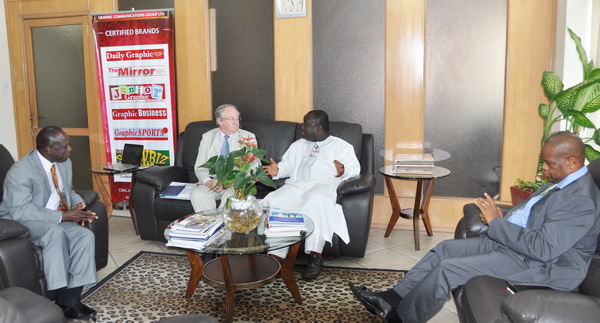Self-discipline key to sustaining media freedoms - Desmond Browne
The ominous consequences of a wayward media in a democratic dispensation will take centre stage on Wednesday when legislator and media practitioner, Desmond Browne, former Chairman of The Bar Council of England and Wales leads discussions on the dicey issue in Accra.
Advertisement
“The media needs to be free but freedom carries duties and responsibilities and the real question is whether the freedom impacts on the duties and responsibilities that the media has. There is a tension between freedom and at the same time exercising the freedom with responsibility and that is what the Media Commission is really in existence to regulate,” Browne posited during a courtesy call on the Managing Director of the Graphic Communications Group Limited (GCGL), Mr. Kenneth Ashigbey on Monday.
Accompanying Dennis Browne were Messrs Kabral Blay-Amihere and Alex Bannerman, Chairman and Deputy Executive Secretary respectively of the NMC.
While acknowledging that fundamental differences exist between the Ghanaian media space and what pertains in Britain, given that the press in Ghana is much more vigorous, much more diverse and has far more different journals than in England, besides the structural differences in regulation - the English press, he said, has set its face against any formal statutory regulation while the Ghanaian press not only has a constitutional provision for freedom of expression, it also has an act of parliament which set up the National Media Commission.
“It’s interesting to see that constitutional, legal structure of the Commission because in England the great battle has been between self-regulation, exclusively self-regulation and statutory regulation. And the press have been (somewhat) hysterical in their reaction to statutory regulation, statutes of any sort. Initially the Prime Minister supported that and said that he wasn’t going to ‘Cross the Rubicon’ into a statutory regulation, but I think now they realise that at the very least even if you don’t have a system as sophisticated as in Ghana where it is a constitutional provision and then an act, at the very least you need the kind of statutory underpinning simply so that everyone joins up,” he explained.
He said while the structure of regulation between the two environments are fundamentally different and does not make either system better than the other, what he hopes to do at the end of the lecture, is to engender that debate that Ghanaians must have.
“It’s really self-discipline isn’t it. You’ve got a regulator so you have to exercise self-discipline and that of course is what has gone wrong in England because the media went beyond simply political partisanship into downright illegality,” he underscored.
 Hefty court fines
Hefty court fines
Mr. Ashigbey who agreed with the call on the media to self-regulate, bemoaned what he said was an unbecoming attitude of certain practitioners who take the freedoms for granted, citing cases where practitioners disregard invitations by the NMC when there are complaints.
“Everybody increasingly is beginning to find out that it’s important for us to self-regulate, that’s critical, but then it’s also important to have an arbiter like the Media Commission which is more interested in press freedom than not regulating us. Because if we are not careful, yes criminal libel is gone but you still have the courts that can impose really harsh fines on you which could virtually also cripple organisations. So a lot of us media practitioners are now finding it out that it’s in our interest to play to the Media Commission. I’m hoping that as we do this 20 years of introspection we would find means of being able to empower more the Media Commission without necessarily taking our freedoms away.”
Mr Ashigbey counselled great caution on the part of the media, failing which he said the media may slip into “media tyranny” and become dictatorial and eventually force the society to roll back all the freedoms generously enjoyed by the media.
He expressed gratitude to the NMC for its support and interventions particularly of reforms and capacity expansions at the GCGL, and urged support for the work of the Commission to further entrench media independence and press freedom in the country, factors he said underpin Ghana’s democracy.




